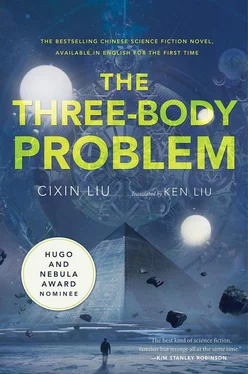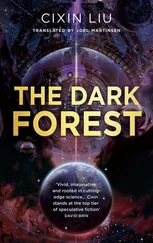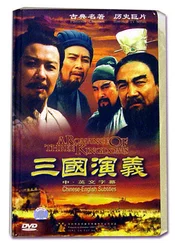Ye had no desire for revenge. Back at Red Coast Base, on that morning of the transmission, she had gotten revenge against the entire human race, including those Red Guards. But she wanted to hear these murderers repent, wanted to see even a hint of the return of humanity.
That afternoon after class, Ye waited for them on the exercise grounds. She didn’t have much hope, and was almost certain that they wouldn’t show up. But at the time of the appointment, the three old Red Guards came.
Ye recognized them from a distance because they were all dressed in now-rare green military uniforms. When they came closer, she realized that the uniforms were likely the same ones they had worn at that mass struggle session. The clothes had been laundered until their color had faded, and they had been conspicuously patched. Other than the uniforms, the three women in their thirties no longer resembled the three young Red Guards who had looked so valiant on that day. They had lost not only youth, but also something else.
The first impression Ye had was that, though the three had once seemed to be carved out of the same mold, they now looked very different from each other. One had become very thin and small, and her uniform hung loose on her. Already showing her age, her back was bent and her hair had a yellow tint. Another had become thick framed, so that the uniform jacket she wore could not even be buttoned. Her hair was messy and her face dark, as though the hardship of life had robbed her of any feminine refinement, leaving behind only numbness and rudeness. The third woman still had hints of her youthful appearance, but one of her sleeves was now empty and hung loose as she walked.
The three old Red Guards stood in front of Ye in a row—just like they had stood against Ye Zhetai—trying to recapture their long-forgotten dignity. But the demonic spiritual energy that had once propelled them was gone. The thin woman’s face held a mouselike expression. The thickset woman’s face showed only numbness. The one-armed woman gazed up at the sky.
“Did you think we wouldn’t dare to show up?” the thickset woman asked, her tone trying to be provocative.
“I thought we should see each other. There should be some closure to the past,” Ye said.
“The past is finished. You should know that.” The thin woman’s voice was sharp, as though she was always frightened of something.
“I meant spiritual closure.”
“Then you want to hear us repent?” the thick woman asked.
“Don’t you think you should?”
“Then who will repent to us?” the one-armed woman asked.
The thickset woman said, “Of the four of us, three had signed the big-character poster at the high school attached to Tsinghua. Revolutionary tours, the great rallies in Tiananmen, the Red Guard Civil Wars, First Red Headquarters, Second Red Headquarters, Third Red Headquarters, Joint Action Committee, Western Pickets, Eastern Pickets, New Peking University Commune, Red Flag Combat Team, The East is Red—we went through every single milestone in the history of the Red Guards from birth to death.”
The one-armed woman took over. “During the Hundred-Day War at Tsinghua, two of us were with the Jinggang Mountain Corps, and the other two were with the April Fourteenth Faction. I held a grenade and attacked a homemade tank from the Jinggang Mountain faction. My arm was crushed by the treads on the tank. My blood and muscle and bones were ground into the mud. I was only fifteen years old.” [40] Translator’s Note: The Hundred-Day War at Tsinghua University was one of the most violent Red Guard civil wars during the Cultural Revolution. Fought between two Red Guard factions, it lasted from April 23 to July 27 in 1968. Mêlée weapons, guns, grenades, mines, cannons, etc. were all used. In the end, eighteen people died, more than eleven hundred were wounded, and more than thirty were permanently disabled.
“Then, we were sent to the wilderness!” The thickset woman raised her arms. “Two of us were sent to Shaanxi, the other two to Henan, all to the most remote and poorest corners. When we first went, we were still idealistic, but that didn’t last. After a day of laboring in the fields, we were so tired that we couldn’t even wash our clothes. We lay in leaky straw huts and listened to wolves cry in the night, and gradually we woke from our dreams. We were stuck in those forgotten villages and no one cared about us at all.”
The one-armed woman stared at the ground numbly. “While we were down in the countryside, sometimes, on a trail across the barren hill, I’d bump into another Red Guard comrade or an enemy. We’d look at each other: the same ragged clothes, the same dirt and cow shit covering us. We had nothing to say to each other.”
The thickset woman stared at Ye. “Tang Hongjing was the girl who gave your father the fatal strike with her belt. She drowned in the Yellow River. There was a flood that carried off a few of the sheep kept by the production team. So the Party secretary called to the sent-down students, ‘Revolutionary youths! It’s time to test your mettle!’ And so, Hongjing and three other students jumped into the river to save the sheep. It was early spring, and the surface of the river was still covered by a thin layer of ice. All four died, and no one knew if it was from drowning or freezing. When I saw their bodies… I… I… can’t fucking talk about this anymore.” She covered her eyes and sobbed.
The thin woman sighed, tears in her eyes. “Then, later, we returned to the city. But so what if we’re back? We still have nothing. Rusticated youths who have returned don’t lead very good lives. We can’t even find the worst jobs. No job, no money, no future. We have nothing.”
Ye had no words.
The one-armed woman said, “There was a movie called Maple recently. I don’t know if you’ve seen it. At the end, an adult and a child stand in front of the grave of a Red Guard who had died during the faction civil wars. The child asks the adult, ‘Are they heroes?’ The adult says no. The child asks, ‘Are they enemies?’ The adult again says no. The child asks, ‘Then who are they?’ The adult says, ‘History.’”
“Did you hear that?” The thickset woman waved an arm excitedly at Ye. “History! History! It’s a new age now. Who will remember us? Who will think of us, including you? Everyone will forget all this completely!”
The three old Red Guards departed, leaving only Ye on the exercise grounds. More than a dozen years ago, on that rainy afternoon, she had stood alone here as well, gazing at her dead father. The old Red Guard’s final remark echoed endlessly in her mind….
The setting sun cast a long shadow from Ye’s slender figure. The small sliver of hope for society that had emerged in her soul had evaporated like a drop of dew in the sun. Her tiny sense of doubt about her supreme act of betrayal had also disappeared without a trace.
Ye finally had her unshakable ideal: to bring superior civilization from elsewhere in the universe into the human world.
Half a year after her return to Tsinghua, Ye took on an important task: the design of a large radio astronomy observatory. She and the task force traveled around the country to find the best site for the observatory. The initial considerations were purely technical. Unlike traditional astronomy, radio astronomy didn’t have as many demands on atmospheric quality, but required minimal electromagnetic interference. They traveled to many places and finally picked a place with the cleanest electromagnetic environment: a remote, hilly area in the Northwest.
The loess hills here had little vegetation cover. Rifts from erosion made the slopes look like old faces full of wrinkles. After selecting a few possible sites, the task force stayed for a brief rest at a village where most of the inhabitants still lived in traditional cave dwellings. The village’s production team leader recognized Ye as an educated person and asked her whether she knew how to speak a foreign language. She asked him which foreign language, and he said he didn’t know. However, if she did know a foreign tongue, he would send someone up the hill to call down Bethune, because the production team needed to discuss something with him. [41] Translator’s Note: Norman Bethune (1890–1939) was a Canadian surgeon who served with the Chinese Communists in their fight against the Japanese invasion force during World War II. As one of the few Westerners who showed friendship to the Chinese Communists, Bethune became a Chinese hero known to the elderly and children alike.
Читать дальше












